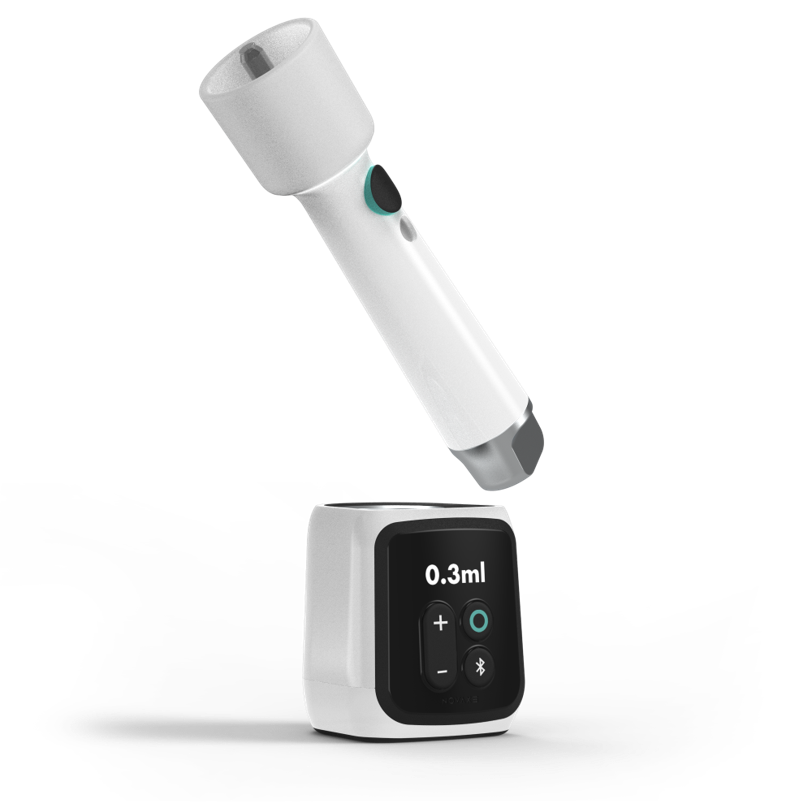Newsletter Signup - Under Article / In Page
"*" indicates required fields
By: Alina Su, CEO and founder of NovaXS Biotech Corp
The next generation of biotech founders are facing new challenges. Despite the access to a world of opportunity on the internet, pursuing your dreams as a Generation Z female biotech founder is not easy.
Gen Z has the unpopular stereotype that they are lazy and unmotivated: This misconception often makes it much harder to gain funding. Women must push through the discrimination they regularly face, especially in business.
But allow me to explain how I made it here today and why my unique advice can help other young founders tell their stories.
Imagine injecting yourself with a needle over 3,000 times over one year. My family didn’t have to imagine such a reality because my sister lived it. She was diagnosed with a chronic condition requiring her to make a one-hour round-trip to the nearest hospital every day for three years to get multiple shots.
Looking back on my childhood, I reflect on the time I spent finding ways to support my sister through her treatments. I am naturally curious, and I remember thinking of ways to improve such an agonizing process.
PhD studies
My inquisitive nature and imagination worked hand in hand with my love for science. Wanting to understand my sister’s medical condition pushed me to study bioengineering at the University of California, Berkeley and now as a PhD student at Harvard Medical School. As a student, I flourished in the lab studying gene editing and degenerative diseases. I began to notice how people navigate the healthcare system and often cannot access the necessary care.
This was when I realized my sister is not alone in the struggle to access quality healthcare, so I wanted to use my expertise for good and take action. I assembled a team of my classmates, professors, mentors, and friends to start NovaXS Biotech Corp, a smart medical device startup building a drug delivery platform to make it easier for people to get access to quality healthcare.
Grit and passion
Despite being a young company, we have the talent and grit to tackle these massive and complex problems and change how we think about drug delivery. We are developing a needle-free medical device that integrates with a smartphone app to deliver medication to patients. This will transform the patient experience making their treatments painless and making it easier for their physicians to monitor and track their progress.
About 14 million people face needle injection treatments daily, all different but face the same problems my sister did. Needle injection treatments have been around for over a century to treat many chronic diseases like diabetes, allergies, growth hormone deficiencies, and more.

For as long as I can, I want to use my knowledge to help people like my sister, but I won’t be able to do it if I don’t set time aside for myself. Creating a work-life balance is critical in maintaining longevity in this industry. I also believe in a collective effort to achieve our short and long-term goals. By placing the value of collective team effort over individual accomplishments, I have found that the work environment thrives and success rises. Finally, I pride myself on prioritizing social good over company profits. I am on a mission to help others, and I don’t want to lose sight of why I entered this industry.
Building relationships to grow capital
Connecting with others and prioritizing building long-lasting relationships with your clients, customers, vendors, investors, and team members over trying to sell them something will lead to long-term success.
It requires patience, but if you can understand what motivates someone and listen to their story, you’ll be able to find ways to make your business relationships mutually beneficial. For example, we have good momentum after receiving investments. We’ve also built relationships with IVF clinics in California to start the clinical testing process and are working on our FDA clearances. I have entered five business competitions, becoming a finalist in all five, and won three of the competitions outright.
In the process, I raised my first million dollars for my company so my team could build a prototype of a new device to provide needle-free delivery of self-administered medicines and have launched a crowdfunding campaign to keep the traction going.
Facing stereotypes as a generation Z biotech female founder
As a young female entrepreneur, I face a lot of stereotypes. My ability is often questioned, and I work hard to be respected by my peers. Most female founders find themselves in a male-dominated industry that does not want to recognize their leadership. I remind myself that these stereotypes are just noise and that I should acknowledge when it’s happening and not let them prevent me from doing my best work. I am persistent, determined, and capable of doing great things, and the people I want around me will see that quickly.
I am reminded of the valuable lessons shared with me by influential female mentors in my life, specifically two leading CRISPR researchers, Irina Conboy and Jennifer Doudna. These women taught me how to navigate a male-dominated industry successfully and push through stereotypes women still face today.
Work-life balance
I aspire to have a long career helping people access quality healthcare, so I must maintain a work-life balance. Starting the day with meditation for about 15 minutes, followed by reading the news for a half hour, sets me on the right track.
I prioritize my afternoons for collaboration with my team, as we are working hard to develop our prototype and kick off our upcoming crowdfunding campaign. In the evenings, I usually have meetings with our partners overseas, but at night I enjoy spending time by myself reading a good book to unwind and recharge.
Building a good team
Prioritizing a collective mindset where people have shared values is the foundation for building a good team. We stay true to our values and focus on solving the problem that impacts millions of people. From day one, NovaXS’ mission has been to make medication self-administration easy and accessible.
Of course, we wouldn’t be where we are today without our talented team, where our collective efforts are much greater than one individuals’ contribution. Enrolling in accelerator programs like mHub MedTech Accelerator, Berkeley SkyDeck, USC Troylabs, and Newchip Accelerator have given us access to resources and mentors to help us fine-tune our business strategies, product development, and leadership skills.
Figuring out how to tell your story
Storytelling is a pivotal way to build credibility with an audience and connect with people on an emotional level. I tell the story behind NovaXS to grab the audience’s attention and provide the “vertical take-off” recommended by storytellers. But I demonstrate another vitally important skill essential for a robust innovation narrative.
I do so by breaking the problem into its parts at the story’s beginning and then paying them off by describing the product features that solve each one. Even in a quick four-minute pitch,
I can accomplish this parallel structure in my storytelling. My angle is so compelling that several prospective investors have asked for the solution themselves. Investors undergoing in vitro fertilization (IVF) treatments asked me to explore this solution for patients like them.
One day, our app will help people with chronic illnesses self-administer treatments and provide their doctors’ data on treatment monitoring. The app will connect to an injector that doesn’t require needles. You just hold it to your skin, and pressure pushes the medicine into your body.
Alina Su, CEO and founder of NovaXS, is an innovator, passionate about creating technology that makes healthcare equal and accessible to all. An entrepreneur, student and inventor, Alina holds six medical device patents in China and the U.S., with three more patent applications pending. Su is a Ph.D. student studying Biological and Biomedical Science at Harvard Medical School.






